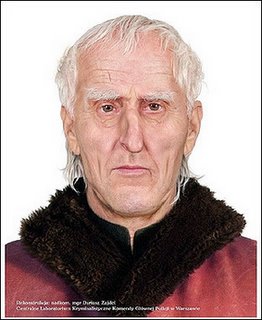Sacrilicious
Oooh, bumper week! (From my temporal perspective, that is. I've got behind in my reading, so the "light cones" of my temporal continuum and of the calendar are a bit out of whack.)
My paternal grandmother's maiden name was Derdzinski. I learned from Polish friends that it's an uncommon name in Poland (despite the fact that it was borne by the first head of the Polish Commie secret police), but reasonably common in western Russia. So, on the basis of no information whatsoever, I dreamed up a fantasy family history that has my ancestors being Russian Jews who became Polish Catholics before coming here. For all the grief that Poles get, though, they have accomplished great things. There's only one uniformed army that ever forced a ceasefire on the Red Army in a war it wanted to fight, and that's the Polish Army. Some historians have considered the Miracle on the Vistula to be as crucial in stopping the westward spread of Bolshevism as the Battle of Tours (A.D. 732) was in halting the northeastward spread of Islam from the Iberian peninsula into the rest of Europe.
Poles have contributed much in more constructive arenas, too: Nobel laureate Marie Curie (née Maria Skłodowska [skwo-DOHV-ska]) was Polish.
Poles also invented the solar system. Well, OK, A Pole invented it: Mikołaj [pronounced MEE-ko-wai] Kopernik (a.k.a. Nicolaus Copernicus). And now we have a face to go with that name. Polish archæologists have probably located his grave. The skull exhibited facial characteristics consistent with descriptions of the man, and appears to have been of the proper age. Here's the forensic reconstruction:

Now, for examples of inertial institutions, you can't do much better than the Roman Catholic Church. (HOW long did they take to rehabilitate Galileo Galilei?) But it does get there in the end. Despite the occasional opportunistic fundie in the ranks (CoughArchbishop Cardinal Christoph SchönbornCough), the Church recognizes that critical thought is one of God's greatest gifts to humanity and it would be ungrateful to ignore it. (Cue the American Evangelicals: if the Catholics accept it, it must be wrong. Woo! Intelligent design! Woo! Question: if you are the product of intelligent design, why are you so stupid? Meh. I've got only one thing to say to the ID crowd: "lower back pain".)
Science is basically about coming to understand process: the how of things. The origin of things, their "why," — not so much. That's the purview of religion. I know the late great Dr. Gould conceived of science and religion as 'non-overlapping magisteria,' but in practice there's a bit more than that. Science takes place in a social, economic, and cultural context. It is inherently neither good nor bad; it is amoral, not (im)moral. What is, is how we make use of it. Science and technology can save us, but they can also kill us. The question is, How much do we trust us? It's an important question, and scientists have an obligation to consider it. Knowledge for knowledge's sake is an ideal that can only be fully realized in a utopia. I say these because they underpin the caveats of the Roman Catholic Church's view of the role of science. Science can't reveal morals or ethics, which we definitely need in our non-utopian world.
Sadly, more and more scientists seem to be missing the point. In my own field, it's most visible in petulant resentment toward the Native American Graves Protection and Repatriation Act [Hey, we dug them up! They're ours! Finders, keepers! And besides, we did it for you.]. But it appears in other fields, too. Timothy Ferris (whose Galaxies [Sierra Club, 1980] is gorgeous) is, sadly, one of the culprits. He takes an "ends justify the means" perspective, and is historically selective in illustrating his argument. More and more I regret learning personal details of people whose professional achievments I admire.
My paternal grandmother's maiden name was Derdzinski. I learned from Polish friends that it's an uncommon name in Poland (despite the fact that it was borne by the first head of the Polish Commie secret police), but reasonably common in western Russia. So, on the basis of no information whatsoever, I dreamed up a fantasy family history that has my ancestors being Russian Jews who became Polish Catholics before coming here. For all the grief that Poles get, though, they have accomplished great things. There's only one uniformed army that ever forced a ceasefire on the Red Army in a war it wanted to fight, and that's the Polish Army. Some historians have considered the Miracle on the Vistula to be as crucial in stopping the westward spread of Bolshevism as the Battle of Tours (A.D. 732) was in halting the northeastward spread of Islam from the Iberian peninsula into the rest of Europe.
Poles have contributed much in more constructive arenas, too: Nobel laureate Marie Curie (née Maria Skłodowska [skwo-DOHV-ska]) was Polish.
Poles also invented the solar system. Well, OK, A Pole invented it: Mikołaj [pronounced MEE-ko-wai] Kopernik (a.k.a. Nicolaus Copernicus). And now we have a face to go with that name. Polish archæologists have probably located his grave. The skull exhibited facial characteristics consistent with descriptions of the man, and appears to have been of the proper age. Here's the forensic reconstruction:

Now, for examples of inertial institutions, you can't do much better than the Roman Catholic Church. (HOW long did they take to rehabilitate Galileo Galilei?) But it does get there in the end. Despite the occasional opportunistic fundie in the ranks (CoughArchbishop Cardinal Christoph SchönbornCough), the Church recognizes that critical thought is one of God's greatest gifts to humanity and it would be ungrateful to ignore it. (Cue the American Evangelicals: if the Catholics accept it, it must be wrong. Woo! Intelligent design! Woo! Question: if you are the product of intelligent design, why are you so stupid? Meh. I've got only one thing to say to the ID crowd: "lower back pain".)
Science is basically about coming to understand process: the how of things. The origin of things, their "why," — not so much. That's the purview of religion. I know the late great Dr. Gould conceived of science and religion as 'non-overlapping magisteria,' but in practice there's a bit more than that. Science takes place in a social, economic, and cultural context. It is inherently neither good nor bad; it is amoral, not (im)moral. What is, is how we make use of it. Science and technology can save us, but they can also kill us. The question is, How much do we trust us? It's an important question, and scientists have an obligation to consider it. Knowledge for knowledge's sake is an ideal that can only be fully realized in a utopia. I say these because they underpin the caveats of the Roman Catholic Church's view of the role of science. Science can't reveal morals or ethics, which we definitely need in our non-utopian world.
Sadly, more and more scientists seem to be missing the point. In my own field, it's most visible in petulant resentment toward the Native American Graves Protection and Repatriation Act [Hey, we dug them up! They're ours! Finders, keepers! And besides, we did it for you.]. But it appears in other fields, too. Timothy Ferris (whose Galaxies [Sierra Club, 1980] is gorgeous) is, sadly, one of the culprits. He takes an "ends justify the means" perspective, and is historically selective in illustrating his argument. More and more I regret learning personal details of people whose professional achievments I admire.


0 Comments:
Post a Comment
<< Home